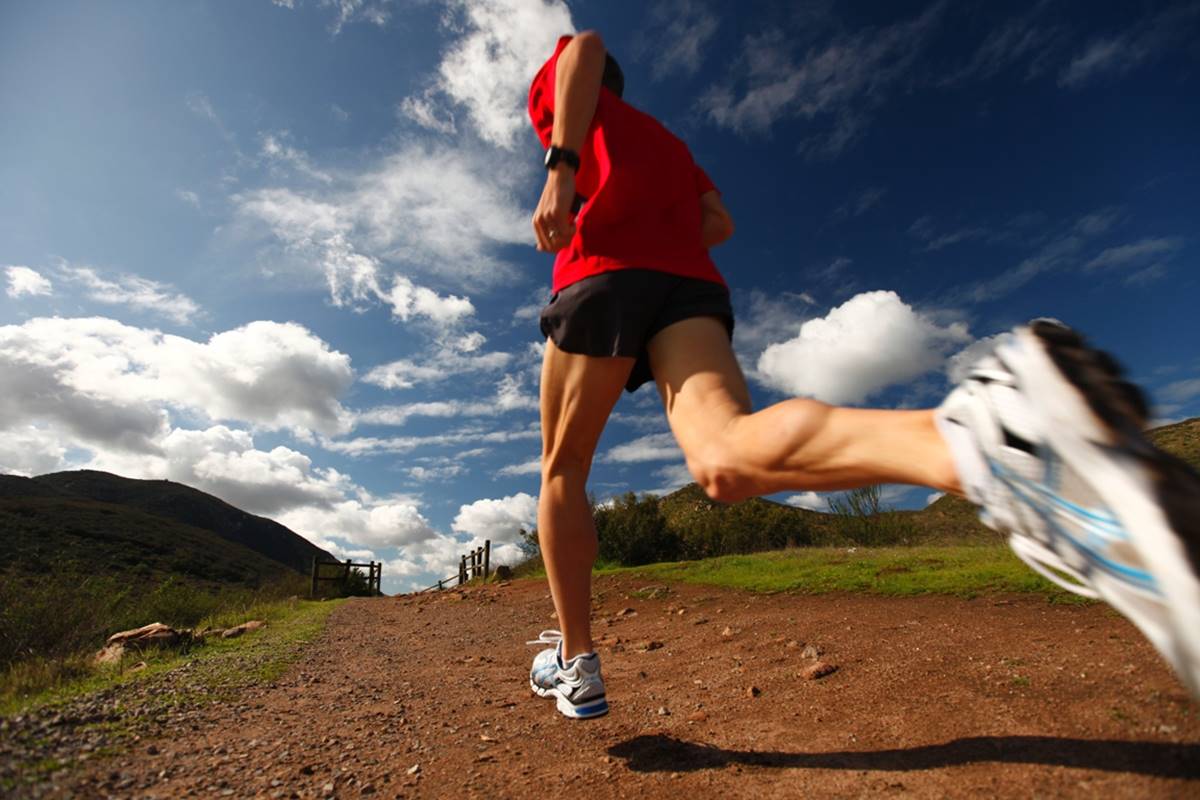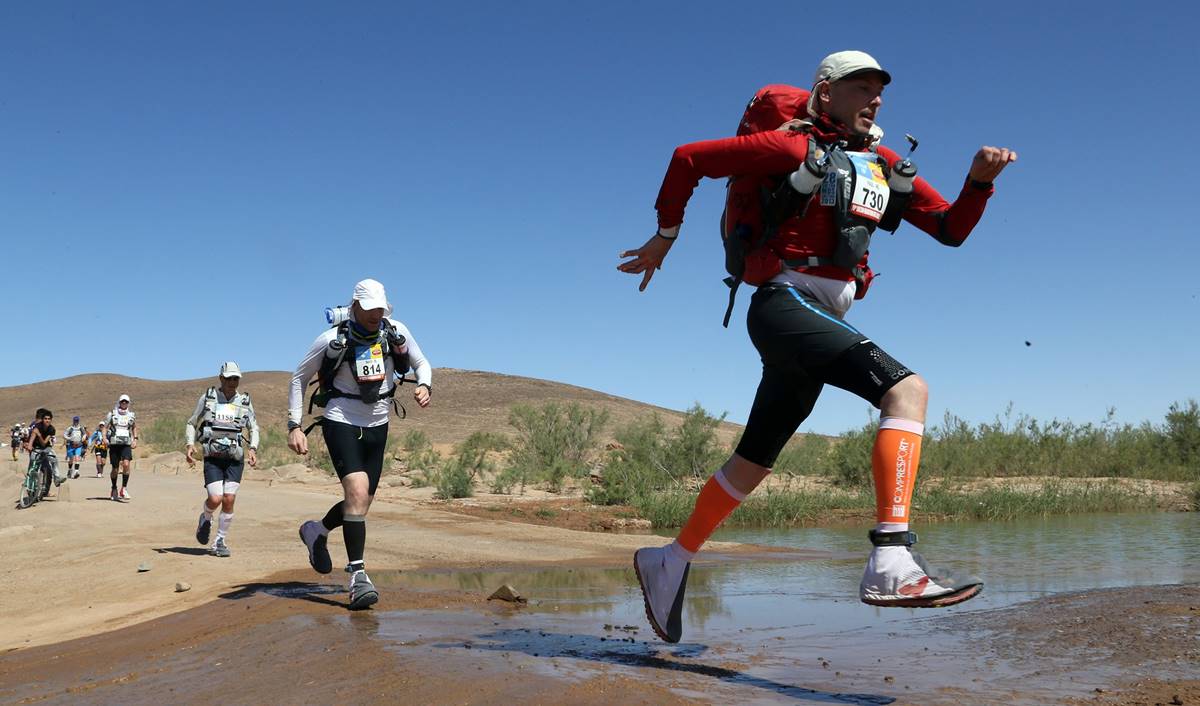Home>Misc>Featured>What Is The Cost Of Running An Ultramarathon


Featured
What Is The Cost Of Running An Ultramarathon
Modified: January 2, 2024
Discover the cost of running an ultramarathon in this comprehensive guide. Get insights on training, gear, nutrition, and more to conquer your next feat. Featured.
Introduction
Welcome to the thrilling world of ultramarathons! If you’re a passionate runner looking to push your physical and mental limits to new extremes, then you’ve come to the right place. Ultramarathons, characterized by their daunting distances often exceeding the traditional 26.2-mile marathon, offer a unique and exhilarating challenge for runners of all levels.
However, before embarking on this epic journey, it’s essential to understand the costs associated with running an ultramarathon. From training expenses to race registration fees and travel costs, participating in an ultramarathon requires careful financial planning. In this article, we’ll break down the various costs you can expect to encounter and help you prepare for this extraordinary feat.
While the costs can vary depending on factors such as the location and duration of the race, we’ll provide a general overview of the main expenses involved. Whether you’re an aspiring ultrarunner or simply curious about the financial commitment required, read on to gain valuable insights into the cost of running an ultramarathon.
Before we dive into the specific expenses, it’s important to note that the ultimate cost of running an ultramarathon extends beyond financial considerations. The dedication, discipline, and determination required to complete the training and race are invaluable. Ultramarathons test not only your physical endurance but also your mental fortitude, creating an unforgettable and transformative experience.
Now, let’s explore the key costs you’ll encounter on your ultramarathon journey.
Training Costs
Preparing for an ultramarathon requires a significant investment of time and effort, and in many cases, financial resources as well. The training process typically involves several months of consistent and structured workouts to build endurance and prepare your body for the rigors of a long-distance race.
One of the primary training costs to consider is a running coach or training program. While it’s possible to train on your own, seeking professional guidance can be immensely beneficial. A running coach can provide personalized training plans, offer expert advice on nutrition and recovery, and help prevent injuries. The cost of hiring a coach or joining a training program can range from a few hundred dollars to several thousand, depending on the duration and level of customization.
In addition to coaching expenses, you may need to invest in suitable running gear and equipment. This includes high-quality running shoes that provide adequate support and cushioning, as well as apparel designed for long-distance running. While these items can be costly initially, they are essential for optimal performance and injury prevention.
Another important consideration is the cost of outdoor training. Ultramarathons often take place on challenging terrains such as trails, mountains, or deserts. As a result, you may need to travel to specific locations to simulate race conditions during your training. This could involve expenses such as transportation and park entrance fees.
It’s also crucial to allocate a budget for nutrition and hydration during training. Long runs and intense workouts require proper fueling to maintain energy levels and promote recovery. This may involve purchasing energy gels, electrolyte drinks, and other nutritional supplements.
Overall, the training costs for an ultramarathon can vary significantly depending on individual choices and circumstances. While it’s possible to keep expenses to a minimum with careful planning and budgeting, it’s important to prioritize your health and safety by investing in appropriate training resources.
Equipment Costs
When it comes to ultramarathon running, having the right equipment can make a world of difference in your performance and overall experience. While the cost of equipment can vary based on personal preferences and desired quality, it’s crucial to invest in reliable gear that can withstand the demands of long-distance running.
The most essential piece of equipment for any runner is a durable and supportive pair of running shoes. Since ultramarathons often involve rough terrains and prolonged hours on your feet, it’s crucial to find shoes that offer excellent cushioning, stability, and traction. Depending on the brand and model, the price range for running shoes can vary from $100 to $300 or more.
In addition to shoes, clothing that is specialized for ultramarathon running is essential. This includes moisture-wicking and breathable tops, shorts or tights, socks, and a hat or visor to protect against the sun. The cost of these items depends on the brand and materials used but can average between $50 to $150 per piece.
Other equipment expenses may include a hydration system such as a hydration pack or belt, which allows you to carry water and other essential supplies during a race. This can range anywhere from $30 to $150 or more, depending on the brand and features.
Furthermore, investing in a reliable GPS watch or other tracking device can help monitor your pace, distance, and heart rate during training and races. These devices can range in price from $100 to $500 or more, depending on the brand and functionality.
It’s important to note that the initial investment in equipment can be significant, but these items are often durable and long-lasting. Regular maintenance and proper care can extend the lifespan of your gear, reducing the need for frequent replacements.
To keep equipment costs manageable, consider conducting thorough research, reading reviews, and seeking advice from experienced ultrarunners. Look for discounts, promotions, and sales to potentially save money on high-quality gear without compromising on performance or comfort.
Remember, investing in reliable and appropriate equipment not only enhances your performance but also ensures a safer and more enjoyable ultramarathon experience.
Race Registration Fees
Participating in an ultramarathon requires registering for a race, and this comes with its own set of costs. Race registration fees can vary greatly depending on various factors such as the race distance, location, prestige, and amenities provided.
First, it’s important to decide which ultramarathon(s) you wish to participate in. Depending on your goals and preferences, you may opt for a local race or aspire to tackle a renowned international event. Local races often have lower registration fees, typically ranging from $50 to $200. These races may be less crowded and offer a more intimate and community-focused experience.
On the other hand, larger and more prestigious ultramarathons tend to have higher registration fees. These races often attract elite athletes and offer enhanced race amenities such as professional timing, aid stations, swag bags, and post-race festivities. The registration fees for such events can range from $200 to over $1,000.
Additionally, some ultramarathons require participants to qualify by completing specific races or achieving certain performance standards. These events often have higher registration fees to ensure a competitive field of runners.
Early bird registration discounts are often available, providing an opportunity to save money by registering well in advance. Similarly, registering closer to the race date, or on-site, may result in higher fees. It’s important to consider these factors when planning your participation to optimize your budget.
It’s worth noting that race registration fees typically cover the basics of organizing the event, such as course preparation, volunteer support, medical services, and race timing. However, additional costs may arise for optional extras such as transportation to and from the race venue, parking fees, and any merchandise or souvenirs you may choose to purchase.
When budgeting for race registration fees, be sure to consider not only the immediate cost but also any associated travel and accommodation expenses. It’s important to research and plan accordingly to ensure the overall cost fits within your desired budget.
In the end, while race registration fees can be a significant expense, these costs contribute to an unforgettable and transformative ultramarathon experience.
Travel Expenses
Participating in an ultramarathon often requires traveling to the race location, which incurs additional expenses. The extent of travel costs will depend on factors such as the distance to the race, mode of transportation, and the duration of your stay.
One of the major components of travel expenses is transportation. Whether you choose to drive, fly, or take public transportation, costs can vary significantly. If you’re driving, consider fuel costs, tolls, and parking fees. If you’re flying, take into account airfare, baggage fees, and ground transportation from the airport to your accommodation.
In addition to transportation, accommodation expenses play a considerable role. The duration of your stay depends on factors such as travel time, pre-race activities, and post-race recovery. You might choose to stay in a hotel, rent a vacation home, or opt for accommodations that cater specifically to athletes, such as race-sponsored hotels or campgrounds. Researching and booking accommodations in advance can help secure better rates and more convenient locations.
Other miscellaneous travel expenses to consider include meals, snacks, and drinks during your trip. This includes pre-race fueling, post-race celebrations, and general sustenance throughout your stay. Depending on your budget and preferences, you can choose to dine out at restaurants, prepare your own meals, or a combination of both.
It’s crucial to develop a realistic travel budget that takes into account not only the direct costs of transportation, accommodation, and meals but also any additional activities or sightseeing you wish to indulge in during your trip. Balancing your desire for exploration with your budget constraints allows you to have a fulfilling travel experience without overspending.
Traveling for an ultramarathon also provides a unique opportunity to bond with fellow runners and explore new locations. It’s important to consider these intangible benefits when factoring in travel expenses, as they contribute to the overall experience and memories you’ll cherish for years to come.
By planning ahead, being mindful of your expenses, and searching for deals or discounts, you can manage and optimize your travel expenses while still enjoying the excitement of exploring new destinations and connecting with the global ultramarathon community.
Accommodation Costs
When participating in an ultramarathon, finding suitable accommodation is an essential part of your overall race experience. The cost of accommodation will depend on various factors such as the location, duration of your stay, and the type of lodging you choose.
One option for accommodation is staying at a hotel or a bed and breakfast. Hotels provide convenience, amenities, and added comfort, but they can also be more expensive. Prices can range from budget-friendly options to luxury accommodations, depending on your preferences and budget. It’s advised to book your hotel room well in advance to secure the best rates.
Another popular option is renting a vacation home or apartment. This can be a more cost-effective and comfortable choice, especially if you are traveling with a group of fellow runners or friends. Websites such as Airbnb or VRBO offer a wide range of rental options with varying prices and amenities. Renting a vacation home allows you to have more space, access to a kitchen for meal preparation, and a cozy home-like environment.
For those seeking a more immersed and communal experience, some races offer race-sponsored accommodations or camping options near the race venue. These options may range from shared dormitories to campsites, providing a budget-friendly and convenient option for participants. However, availability may be limited and booking in advance is recommended.
Another option to consider is staying with friends or family who live in the area. This eliminates accommodation costs and provides an opportunity to spend time with loved ones, making the race experience even more enjoyable and meaningful.
Regardless of the accommodation type you choose, it’s important to factor in the duration of your stay. Longer races or races with multiple stages may require extended stays, increasing the overall cost. Planning your accommodation options and duration in advance will help you budget accordingly.
Lastly, consider the proximity of the accommodation to the race venue. Staying within walking distance of the start or finish line can offer convenience and peace of mind on race day. However, if the race is in a remote area or if accommodation near the race venue is limited, you may need to arrange transportation to and from the race location, potentially adding an extra cost to your budget.
By carefully considering your preferences, budget, and race logistics, you can find suitable accommodation that enhances your ultramarathon experience without breaking the bank.
Nutrition and Hydration Expenses
Proper nutrition and hydration are vital for success and safety during an ultramarathon. As you push your body to its limits, it’s crucial to fuel it with the necessary nutrients and fluids. However, these essential elements come with their own associated costs.
One of the main considerations is the cost of nutrition and hydration products. During training and the race itself, you’ll need to replenish your energy levels and maintain proper hydration. This may involve purchasing energy gels, electrolyte drinks, protein bars, and other snacks specifically formulated for endurance athletes. The cost of these products can vary depending on the brand, quality, and quantity.
It’s important to experiment with different brands and products during training to find what works best for you. While it may be tempting to opt for the cheapest options, keep in mind that quality and effectiveness can vary. Prioritize products that are specifically designed for endurance activities to ensure optimal performance and recovery.
In addition to nutrition and hydration products, you’ll also need to consider the cost of obtaining fresh fruits, vegetables, lean proteins, and other wholesome foods that support your training and race preparation. Incorporating a well-rounded diet not only fuels your body but also promotes overall health and well-being.
If you prefer homemade meals and snacks, accounting for the cost of groceries and meal preparation is crucial. This may involve purchasing ingredients such as whole grains, lean proteins, and healthy fats. Planning your meals in advance and buying in bulk can help reduce costs and ensure that you have the necessary ingredients readily available.
Another factor to consider is specialized equipment for carrying nutrition and hydration. This includes hydration packs, handheld water bottles, or waist belts to conveniently carry fluids and snacks during long training runs and races. The cost of these items will vary depending on the brand, features, and functionality you desire.
When budgeting for nutrition and hydration expenses, it’s important to strike a balance between investing in high-quality products and staying within your financial means. Remember that proper fueling is an essential component of a successful ultramarathon, and cutting corners in this area can have negative consequences on your performance and recovery.
Taking the time to research and compare prices, looking for sales or discounts, and buying in bulk when possible can help manage these expenses. Additionally, reaching out to experienced ultrarunners or nutritionists for advice and cost-effective solutions can provide valuable insights.
Overall, ensuring proper nutrition and hydration during training and races is a worthy investment that can make a significant difference in your performance and overall experience.
Medical Expenses
Ultramarathons are physically demanding events that push your body to its limits. While you train and compete with the goal of staying healthy and injury-free, it’s important to consider potential medical expenses that may arise during your ultramarathon journey.
One of the primary medical expenses to consider is the cost of preventive care. Regular check-ups with your healthcare provider and screenings to assess your overall health and identify any potential issues are essential. Depending on your insurance coverage, copayments or out-of-pocket expenses may apply for these visits.
In the months leading up to your ultramarathon, you may choose to consult with a sports medicine physician or physical therapist. These professionals can provide guidance on injury prevention, aid in your training plan, and address any concerns you may have. The cost of these consultations will depend on your insurance coverage or if you choose to pay out-of-pocket.
In the unfortunate event of an injury or illness, you may need to seek medical attention during your training or after completing your race. This can include visits to a doctor, physical therapist, or other healthcare providers. Depending on the nature and severity of the injury or illness, costs can vary significantly.
It’s important to include the cost of physical therapy, specialized treatments, or rehabilitation services in your budget. These services can aid in your recovery and help prevent further complications. Insurance coverage may help offset some of these expenses, but it’s crucial to be aware of any deductibles or copayments that may apply.
If you require medical attention while participating in an ultramarathon, race organizers usually provide on-site medical support. This can include medical tents, emergency medical personnel, and ambulances for more serious situations. However, depending on the circumstances, you may still incur expenses for these services that are not covered by your insurance. Understanding the extent of your insurance coverage and having a contingency plan in place for unexpected medical expenses is essential.
Additionally, it’s advisable to have travel insurance or adequate health coverage that applies when you participate in an ultramarathon, especially if you’re racing in a different country. This coverage can help alleviate the financial burden associated with medical emergencies or unexpected healthcare needs during your trip.
A proactive approach to your health and wellbeing, combined with understanding your insurance coverage and having a contingency plan, can help mitigate potential medical expenses and ensure that you can focus on your training and race without unnecessary financial stress.
Post-Race Recovery Costs
Completing an ultramarathon is a significant accomplishment, but the physical toll it takes on your body requires proper post-race recovery. It’s important to consider the potential costs associated with recovering and rejuvenating after your race.
One of the key expenses to consider is post-race therapy and treatments. Massage therapy, physiotherapy, and chiropractic sessions can help alleviate muscle soreness, promote recovery, and prevent injuries. Depending on the frequency and duration of these treatments, costs can vary. It’s advisable to inquire about pricing, package deals, or discounts specifically designed for athletes to make the most of your budget.
Another aspect of post-race recovery is rest and relaxation. Giving your body time to recover and rejuvenate is crucial for long-term health and wellness. This may include taking time off work or other responsibilities, allowing your body to heal and recharge. While there might not be a direct financial cost associated with this, it’s important to plan for any potential loss of income or the need for additional support during your recovery period.
During the recovery phase, prioritizing proper nutrition is essential. This may involve purchasing nutritious foods, supplements, and vitamins that support the healing process and replenish depleted nutrients. While the cost of these items can vary, it’s essential to prioritize your recovery by providing your body with the necessary nutrients it needs.
Additionally, participating in post-race activities such as celebratory dinners or gatherings with your fellow ultrarunners can be a rewarding experience. Budgeting for these social gatherings, including meals and drinks, allows you to commemorate your achievements and enjoy the camaraderie of the running community.
Transportation and travel expenses related to returning home after the race should also be taken into account. If you’re traveling a long distance, you may need to consider the cost of flights, transportation to the airport, and potentially additional baggage fees if you’re carrying equipment or race souvenirs. Planning your return trip in advance can help ensure a smooth and budget-friendly journey.
Overall, it’s important to prioritize your post-race recovery to avoid burnout and ensure long-term physical and mental well-being. By considering the potential costs associated with post-race treatments, rest, nutrition, and social activities, you can plan and budget effectively to support your recovery journey.
Conclusion
Participating in an ultramarathon is a challenging and rewarding endeavor that requires dedication, commitment, and a strong financial plan. Understanding the various costs associated with running an ultramarathon allows you to prepare and budget accordingly, ensuring a smooth and enjoyable experience.
From training costs to equipment expenses, race registration fees, travel expenses, accommodation costs, nutrition and hydration expenses, potential medical expenses, and post-race recovery costs, there are several financial considerations to take into account. By carefully assessing your options, prioritizing your needs, and making informed decisions, you can manage these expenses and optimize your ultramarathon journey.
Remember, while the financial investment of running an ultramarathon can be significant, the rewards and experiences gained are invaluable. The physical and mental challenges you’ll overcome, the personal growth you’ll achieve, and the connections you’ll make within the running community have lasting effects that surpass any monetary value.
Keep in mind that every runner’s financial situation is unique, and it’s important to tailor your budget to fit your specific needs and circumstances. Researching and exploring cost-saving measures such as early bird registration discounts, sales on equipment or gear, and affordable accommodation options can help make the experience more accessible and enjoyable.
Lastly, remember that an ultramarathon is not just a test of physical endurance; it’s a testament to the indomitable human spirit. Embrace the challenge, savor the journey, and celebrate your accomplishments, knowing that the cost of running an ultramarathon is a small price to pay for the immense satisfaction and personal growth that awaits you at the finish line.









